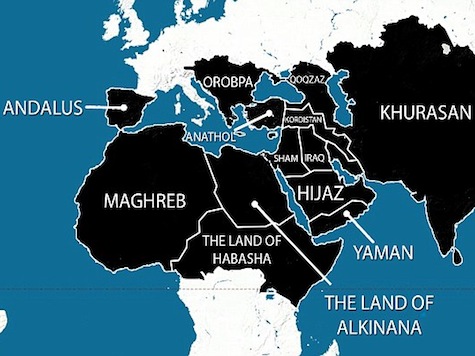The terrorists of the Islamic State (ISIS, or ISIL) have taken their fight beyond their initial enemies–the U.S. and their Arab/Muslim rivals–and have declared their intent to challenge powers far beyond, including Russia. The notion of a global conflict might satisfy the Islamic State’s ideological vision of a Muslim caliphate, but it may also unite the fractured Great Powers to crush ISIS in a war that could spread across several continents.
ISIS issued a threat to Russian president Vladimir Putin earlier this week, after the group seized control of a Syrian airfield with Russian jets and equipment supplied to the regime of Bashar al-Assad. The message from ISIS included a warning that the aircraft would be used against Russia, and a call for Chechnya to be “liberated” from Russia–a long-standing wish of Islamists in the region, well before ISIS began fighting in Syria and Iraq.
In addition, ISIS has turned up in Israel, holding a rally earlier this week on the Temple Mount in Jerusalem’s Muslim Quarter. While just a few months ago ISIS downplayed its ambitions towards Israel, its military success has emboldened Islamists throughout the Middle East. ISIS is reported to be recruiting more supporters in Afghanistan and Pakistan, as Al Qaeda scrambles to compete with its new rival on the subcontinent.
Some analysts, notably Charles Krauthammer, believe that ISIS is more dangerous than Al Qaeda because it is more focused on state-building than on expanding its global presence. Yet there is no reason ISIS cannot do both–or take over Al Qaeda operations, much like a corporate merger. The black flag ISIS has adopted has already featured at anti-U.S. demonstrations elsewhere for years, including at the Cairo embassy in 2012.
Indeed, ISIS may hope to take its fight to the borders of Islamic influence–and beyond. In addition to recruiting fighters from Europe and North America–and possibly sending them back to carry out attacks–ISIS has also reportedly begun drawing volunteers from China. Two months ago, the Islamic State released a map outlining its global ambitions–and the group apparently plans to expand the Islamic empire beyond its historic reach.
The result is that ISIS may prod the world’s leading nations–at odds for over fifteen years over Kosovo, Iraq, and Ukraine, among other issues–to cooperate against a common threat. The five veto-wielding nations of the UN Security Council, representing the allies of World War II, may once again revive that alliance, setting aside other grievances. It may be a unique opportunity for the world to wrest some order from the ongoing chaos.

COMMENTS
Please let us know if you're having issues with commenting.